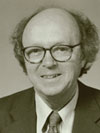| Home | Blog | Ask This | Showcase | Commentary | Comments | About Us | Contributors | Contact Us |

Anthony Lewis on the Framers, the 1st Amendment and watchdog reportingCOMMENTARY | April 99, 2004Nieman Watchdog editors asked Anthony Lewis to look into what the Founding Fathers thought about watchdog reporting. He found big defenders in Madison and Jefferson. By Anthony Lewis Did the Framers of the First Amendment want to protect what we call watchdog reporting? Were they ready to have officials suffer under the probing of a press that looks out for official wrongdoing? If we judge by the principal author of the First Amendment, James Madison, the answer to those questions is an unhesitating Yes. Madison thought a press that kept watch on government was essential to the survival of the new form of government he and his colleagues had created, a federal republic. He had no illusions about the perfection of newspapers or the people who wrote and edited them; he spoke of their "abuse." But he said they were entitled to constitutional protection even when they published false statements, so valuable was their role. Madison set out his views in eloquent detail during the struggle over the Sedition Act of 1798. Passed by a Federalist-dominated Congress and signed into law by a Federalist President, John Adams, the statute made it a crime to criticize the President. It did not punish critics of the Vice President, Thomas Jefferson, Adams's political enemy. Federalist politicians said the Sedition Act was needed to counter the danger of French Jacobin terror (after the French Revolution) infiltrating the United States. The real reason for it was the Federalists' desire to put down Jeffersonian voices in the run-up to the election of 1800, when Adams would face Jefferson. Leading Jeffersonian editors and proprietors were convicted under the act, fined and imprisoned. The statute supposedly allowed a defense of truth. But Federalist judges upheld charges for language that was mere abuse, not factual. James T. Callender was convicted for a book that called Adams a "hoary headed incendiary" and told voters that the choice was between "Adams, war and beggary, and Jefferson, peace and competency." Callender was sentenced to nine months in prison and a fine of $200. Madison protested against the Sedition Act as a violation of the First Amendment, which had been added to the Constitution only seven years before. A resolution drafted by him and passed by the Virginia legislature said the act claimed a power "not delegated by the Constitution, but, on the contrary, expressly and positively forbidden by one of the amendments thereto – a power which, more than any other, ought to produce universal alarm, because it is leveled against the right of freely examining public characters and measures, and of free communication among the people thereon, which has ever been justly deemed the only effectual guardian of every other right." "Examining public characters and measures" – that is what watchdog reporting does. Madison wrote a Report on the Virginia Resolution that went deeper into the philosophical reasoning behind the belief in a free, active press. The common law of England allowed suppression of the press, he said. But the founding premise of government in this new country was "altogether different," Madison said. "The people, not the government, possess the absolute sovereignty." It followed that the people, the ultimate sovereigns, must have information on which to base their decisions – their votes. "Is it not natural and necessary, under such different circumstances, that a different degree of freedom in the use of the press should be contemplated?" Madison, though aware of its faults, praised the press in terms lavish enough to make us blush. "Some degree of abuse is inseparable from the proper use of everything," he wrote, "and in no instance is this more true than in that of the press. It has accordingly been decided by practice of the States, that it is better to leave a few of its noxious branches to their luxuriant growth, than, by pruning them away, to injure the vigor of those yielding the proper fruits. And can the wisdom of this policy be doubted by any who reflect that to the press alone, chequered as it is with abuses, the world is indebted for all the triumphs which have been gained by reason and humanity over error and oppression…?" Jefferson was perhaps less romantic about the press, but he saw its vital role in a democracy. In 1786 he wrote a friend, Dr. J. Currie: "I deplore the putrid state into which our newspapers have passed, and the malignity, the vulgarity, and mendacious spirit of those who write them…. These ordures are rapidly depraving the public taste. It is however an evil for which there is no remedy, our liberty depends on the freedom of the press, and that cannot be limited without being lost."
|



